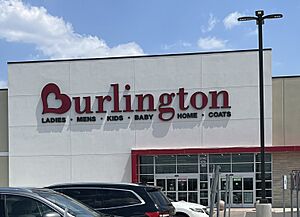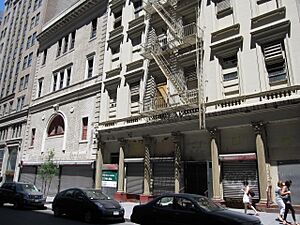Burlington (department store) facts for kids
 |
|

Burlington store in San Antonio, Texas
|
|
|
Trade name
|
Burlington |
|---|---|
|
Formerly
|
Burlington Coat Factory (1972–2009) |
| Public | |
| Traded as |
|
| Industry | Retail |
| Founded | 1972 (as Burlington Coat Factory) |
| Founder | Monroe Gary Milstein Henrietta Milstein (nee Haas) |
| Headquarters | Burlington, New Jersey, U.S. |
|
Number of locations
|
1,115 (2025) |
|
Key people
|
|
| Products | Clothing, baby clothing, jewelry, accessories, shoes, furniture, home decor, toys, pet supply, and gifts |
| Revenue | |
|
Operating income
|
|
| Total assets | |
| Total equity | |
|
Number of employees
|
40,000 (2018) |
Burlington, once known as Burlington Coat Factory, is a large American store chain. It sells many different items at lower prices than regular department stores. Burlington has over 1,100 stores across 47 states and Puerto Rico. Its main office is in Burlington Township, New Jersey.
In 2007, a company called Bain Capital bought Burlington. Then, in 2013, Burlington became a public company again, meaning its shares could be bought and sold on the stock market. Today, Burlington is one of the biggest off-price retailers, after TJX Companies and Ross Stores.
Contents
How Burlington Started and Grew
The story of Burlington began in 1972. Monroe Gary Milstein and his father, Abe, had been in the clothing business since 1946. Monroe's wife, Henrietta Milstein, found an old factory outlet in Burlington, New Jersey. She convinced Monroe to buy it for $675,050. Henrietta used money she had saved from her job as a librarian for most of the down payment.
At first, the Milsteins mainly sold coats and jackets. But to make their business less dependent on seasons, they started adding other items. Soon, they sold clothes, accessories, home goods, baby items, and shoes.
Expanding Across the Country
In 1975, a second store opened in Copiague on Long Island. Monroe asked his son, Lazer, to come back from Israel to help. Lazer agreed, but only if the new store closed on Saturdays to respect the Sabbath. At that time, many businesses faced legal issues for being open on Sundays. However, there was an exception for religions that observed a different Sabbath day.
By 1983, the company had 31 stores. It officially became a public company, which meant people could buy shares in it.
Changes in Ownership
In 2006, a company called Bain Capital Partners bought Burlington for over $2 billion. The Milstein family, who owned a large part of the company, made a lot of money from the sale. Monroe Milstein was no longer involved in the business after this.
In 2012, Burlington received money from the state of New Jersey. This helped them build a new main office in Florence. This kept the company from moving its headquarters out of the state.
In October 2013, Burlington's stock went public again and its value increased a lot on the first day. By that time, the company had 503 stores. These stores operated under names like Burlington Coat Factory, Cohoes Fashions, Baby Depot, and MJM Designer Shoes.
In 2016, Burlington Stores joined the Fortune 500 list for the first time. This list includes the 500 largest companies in the United States.
More recently, Burlington has expanded by taking over store locations from other companies. In June 2023, they bought the leases for over 40 closed Bed Bath & Beyond stores. In 2024, Burlington also acquired leases for 15 locations from the Texas-based retailer Conn's.
Helping Others: Charitable Work
Burlington has worked with many charities for years.
Supporting Health Causes
Since 2002, Burlington has partnered with the Leukemia and Lymphoma Society. They collect donations at checkout counters for the Light the Night campaign. By 2013, the company had raised over $19 million for this cause.
In 2012, Burlington also teamed up with WomenHeart. This group helps women learn about heart health. As part of this, Burlington holds a yearly Red Dress Event. They sell red dresses, and $1 from each sale goes to WomenHeart. In 2014, they even had a "Heart of Style Tour" bus. This bus visited stores, offering blood pressure checks and health information.
Donating Warm Coats
In 2006, Burlington started the Warm Coats and Warm Hearts Drive. This program collects donated coats for people who need them. Burlington stores act as drop-off points. Local charities then give the coats to people in the area. Since this program began, over 1.2 million coats have been collected and given away.
Business Challenges and Fun Facts
Like many big companies, Burlington has faced some challenges and has interesting stories.
Fur Labeling Issues
Burlington Coat Factory was once investigated by the Humane Society of the United States. They were accused of labeling real fur products as "faux fur" (fake fur). After an investigation, the company agreed to stop these false advertisements. It was found that some "faux fur" items were actually made from animal pelts.
The "Not Affiliated" Disclaimer
From 1981 to 2009, Burlington Coat Factory's logo often included the words "Not Affiliated with Burlington Industries." This was because of an agreement with a fabric company called Burlington Industries. Even after Burlington Industries stopped operating in 2004, the disclaimer stayed on Burlington Coat Factory's ads until 2009.
The Snake Urban Legend
In the early 1990s, a funny rumor spread that snakes were hiding in coats sold at Burlington. A company representative explained that this was not true. They said that their stores and warehouses were kept at a cool temperature, which a snake would not be able to survive.
A Building's Unexpected History
On September 11, 2001, a part of a plane from the World Trade Center attacks crashed through the roof of the Burlington Coat Factory store at 45 Park Place in New York City. This store was Burlington's first location in Manhattan. The building suffered major damage.
See also
- TJX Companies
- Ross Stores
- List of department stores of the United States




